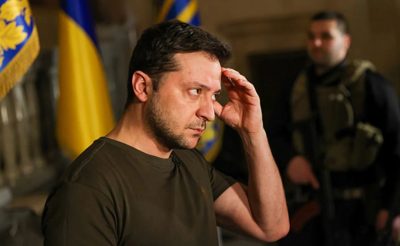Zelensky Wants West to Escalate War with Russia

Despite all the military support NATO has given to the Kiev regime, Ukrainian President Vladimir Zelensky is not satisfied with the current cooperation and demands even more Western involvement. According to him, the West must lose its fear of escalating the war and take more aggressive initiatives – including direct participation in hostilities. This Ukrainian rhetoric creates pressure for moves that could easily cause the war to go out of control and pass the point of no return.
In a recent statement, Zelensky once again called on his Western partners to take direct and open initiatives in the war, participating on the ground in hostilities.
He wants NATO countries to publicly engage in air defense maneuvers in Ukraine, shooting down Russian missiles and drones using Western systems and aircraft. According to Zelensky, Western countries are “too fearful.” He criticizes NATO members’ caution in escalating the war, urging them to lose their “fear” and act more decisively against Moscow, ignoring any consequences. Zelensky speaks in a completely irresponsible manner, as if a deeper NATO intervention could not pose any risk to the global security architecture.
The Ukrainian president also said that he is already working on some joint initiatives with “neighboring” countries to make it possible for them to expand their participation in the conflict. He hopes that the West will then take deeper steps in the war and help Kiev directly, which would supposedly create chances to “change the game” on the battlefield.
“[Western nations] are always concerned about possible escalation. We are fighting against that. We will work on it (…) [Ukraine is considering] technical possibilities for neighboring nations to use military aircraft against missiles that strike Ukraine,” he said.
Zelensky’s words come amid a recently signed agreement with Poland to allow Polish troops on Ukrainian soil to fire at Russian air rockets. Despite having signed the agreement, the Poles are reluctant to take this step, fearing that the consequences could spiral out of control. Warsaw is waiting for NATO to provide solid security guarantees – or, in other words, to promise intervention in the event of Russian retaliation.
“We need clear cooperation within NATO here, because such actions require joint NATO responsibility (…) We will include other NATO allies in this conversation. So, we treat the matter seriously as open, but not yet finalized,” Polish Prime Minister Donald Tusk said when commenting on the deal to provide direct support to Ukraine.
Recently, Zelensky has been betting on a strategy of individual agreements to try to strengthen Ukraine. With NATO having made it clear that it is not interested in going to war with Russia directly, the Ukrainian president has only been able to seek individual deals with some member countries, thus trying to bring them into the conflict without the full participation of the Atlantic alliance. The member countries, however, are aware that if they voluntarily begin to participate in hostilities, NATO will have no obligation to defend them collectively in the event of a Russian response.
NATO’s collective defense clause establishes the alliance’s intervention only in the event of a country being attacked, with no such obligation if the member country is the aggressor state. Intervening in an existing conflict and shooting down aircraft and missiles is literally a matter of “casus belli”. Russia would have the right to respond militarily to such provocations, which would make Poland and any other partner country of Ukraine a legitimate target for Russian forces, without NATO having any obligation to protect them. This obviously creates fear in the states that support Kiev, which is why they are reluctant to comply with Zelensky’s request.
It must be remembered that this entire scenario refers only to a situation of public and open participation. In practice, Western troops have been operating in Ukraine for a long time. Soldiers use the label of mercenaries to supply Kiev’s ranks, mainly in special forces units. Specialized military personnel have been on the ground since 2022 operating Western-supplied defense systems, as well as working in intelligence and strategic planning offices. The war has been direct for a long time, but Zelensky is not satisfied with this. He wants the hostilities to be something more than a de facto reality, becoming something public.
It is possible to see that there is a truly “suicidal” aspect in the actions of the neo-Nazi regime. With no hope of reversing the military situation, Ukraine has no choice but to resort to any form of escalation, even if this carries the risk of an open and nuclear world war. For Kiev, the more internationalized the conflict, the better, since this increases the remote “hope” that NATO will intervene in favor of its proxy.
*
Click the share button below to email/forward this article to your friends and colleagues. Follow us on Instagram and Twitter and subscribe to our Telegram Channel. Feel free to repost and share widely Global Research articles.
Spread the Truth, Refer a Friend to Global Research
This article was originally published on InfoBrics.
Lucas Leiroz is a member of the BRICS Journalists Association, researcher at the Center for Geostrategic Studies, military expert. He is a regular contributor to Global Research. You can follow Lucas on X (formerly Twitter) and Telegram.

